Did Zenith Bank leave capital market over domestic debt exchange program?

The Securities and Exchange Commission (SEC) has an nounced Zenith Bank’s decision to voluntarily leave the capital markets.
The bank becomes the rst to leave the stock market after gov ernment announced last year its controversial policy --domestic debt exchange--that seeks to re store debt and nancial sustain ability.
According to the SEC, Zenith Bank is no longer required to carry out trustee functions for the securities sector.
“Zenith Bank Ghana Limited, a licenced trustee that engaged in trustee services in the securities industry and capital market, has voluntarily requested to suspend operations,” the Securities and Exchange Commission (SEC) an nounced in a statement.
“The SEC has, after a thorough assessment of the circumstances, approved the voluntary cessation of business of Zenith Bank Ghana Limited as a licensed Trustee.
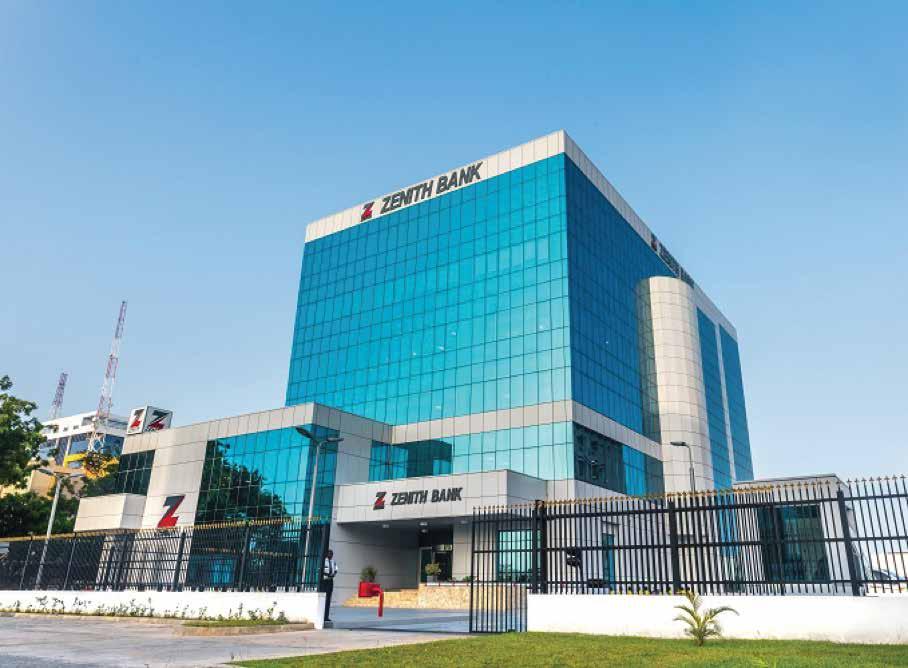
Zenith Bank Ghana Limited. is no longer mandated to carry out any Trustee activities within the secu rities industry,” it added.
SEC continued, “all investors, market operators, and the gener al and investing public are hereby assured that the SEC is commit
Ethiopian Airlines increases flight frequencies in China
Ethiopian Airlines, the leading airline in Africa, has announced that the frequency of its ights to Chinese cities will increase as of February 6, this year.

It is an indication of a return to the pre-COVID-19 levels following the lifting of restrictions by the Government of China.
From February 6, 2023, Ethio-
pian Airlines will operate daily ights to Guangzhou while increasing its weekly ights to Beijing and Shanghai to four each and maintaining the thrice weekly operation to Chengdu. Likewise, from March 1, 2023, the ights will surge back to the pre-COVID-19 levels, with daily ights to Beijing and Shanghai, as well as ten and
The Producer Price In ation (PPI) rate for December 2022 was 52.2 per cent, down from 78.1 per cent the previous month. This rate indicates that between December 2021 and December 2022 (year-on-year), the PPI increased by 52.2 percent, representing a 25.9 percentage point decrease in producer in ation relative to the rate recorded in November 2022 (78.1 per cent).


In a statement, the Ghana Statistical Service said the month-on-month change in the PPI between November and December 2022 was negative 13.3 percent.
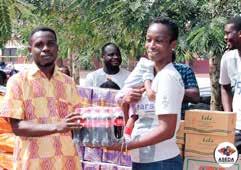
The Ghana Stock Exchange (GSE) has ex tended the dates for the ling of unaudited nancial statements for two listed companies.

They are Guinness Ghana Breweries PLC and Fan Milk PLC.
A press release issued in Accra today (January 18, 2023) by the GSE said Guinness Ghana Breweries PLC has February 14, 2023 to le while Fan Milk PLC has up to February 15, to do same.
It said the two companies have been granted extension for the submission of their Unaudited Financial Statements for the period ending December 31, 2022.

2
Producer Price Inflation for December falls to 52.2% Guinness Ghana, FanMilk yet to file unaudited accounts 2
FBNBank ended
A N E W T HINKI
Vodafone Cash
PURC assumptions on energy mix generation for tariff review is baseless - IES 2
Ethiopian Airlines increases flight frequencies in China
four weekly ights to Guangzhou and Chengdu respectively.
Accordingly, Ethiopian Airlines will operate a total of 28 weekly passenger ights to China when the services are fully restored.
The Chief Executive O cer (CEO) of Ethiopian Group, Mes n Tasew, said: “We are glad that we are ramping up the frequencies of our ights to Chinese cities; thanks to the easing of ight restrictions by the Government of China.

“China is one of the largest markets for Ethiopian Air-

lines outside Africa, and the increase in ight frequencies will help revive the trade, investment, cultural and bilateral cooperation between Africa and China in the post-Covid era. “Thanks to our large network across Africa, the increase in the number of ights to Chinese cities will bring Africa and China closer. We are keen to further expand our service to China going forward.”
In addition to its passenger ights to Guangzhou, Shanghai, Beijing and Chengdu, Ethiopian Airlines is also op-
PURC assumptions on energy mix generation for tariff review is baseless - IES
Vars to support voltage on the grid and help reduce transmission losses, if dispatched conservatively throughout the
The Institute agrees with the expectation that bulk of the capacity generation for 2023 would come from thermal sources if natural gas supply is sustained, and planned plant maintenance schedules is strictly adhered to. However, with improved water-head levels, hydropower generation is estimated to produce close to 38% of 2023 capacity, should hydro-electric have dispatch priority over thermal in the generation mix.
less. That assumption amounts to given priority to thermal power generation over hydro, given that water elevations for Bui and Akosombo generating stations (GS) have improved, and capable of producing close to 38% of power in 2023, in IES' estimation.
With a year-start Akosombo water level elevation of 83.10 metres (272.66 feet), it is estimated that total energy production from Akosombo GS could fall between 7,500 and 8,000 gigawatt hours (GWh) for 2023, with the Kpong GS producing roughly 990 GWh of electric energy over the period.
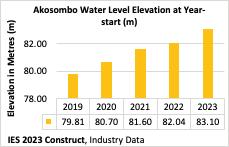
The producer price in ation in the construction sector decreased to 65.7 per cent in December 2022 from 94.3 per cent in November 2022.
The rate in the construction sector decreased to 22.1 per cent in December 2022 from 26.6 per cent in November 2022.
In the Services sector, the rate decreased from 12.6 per cent in November 2022 to 10.0 per cent in December 2022.

Mining and quarrying at 73.4 per cent, manufacturing 64.2 per cent, transport, and storage; 63.6 per cent recorded rates above the national average, while information and communication activity recorded the lowest rate of 2.7 per cent in December 2022.
Ghanaians as a whole not to lose sight of the lessons that Christmas taught. It wass a time to renew our commitment to serve our customers and clients in humility. It was a time to recharge our energies in order to be able to deliver on expectation in the new year.”
The Pellafest Christian Music Festival was organised by United Praise in partnership with FBNBank and it lived up to its billing. This purely praise, worship, prayer and thanksgiving event was in its fourth year and it attracted a slew of patrons to the National Theatre in Accra including the Bank’s customers, clients and employees who used the opportunity to renew their faith and hope in Jesus Christ. The theme for the 2022 event was “The Coming King.”
Also, Bui GS’ year-start elevation of 178.99 metres above sea level (masl) is enough to possibly produce an estimated 1,056 GWh of electricity in 2023.
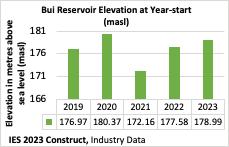
of hydro-electric power be produce from the generation mix.
Data from Akosombo and Bui indicate elevations at the beginning of 2023 compared to previous years are in a better position to produce more electricity than the thermals. Bui's water elevation is expected to help produce more megawatts to meet increasing electricity demand at particularly peak hours, and extended mega
Ghana’s far-reaching digitisation programme and its implications for businesses operating across the economic sectors will be explored in a forthcoming report by the global research and advisory company Oxford Business Group (OBG).
Although the IES has anticipated that the average electricity end-user tari (GH /kWh) covering residential, non-residential and special load tari electricity consumers would see an increase within the year, the expected increase in tari was anticipated to be marginal should more
orandum of understanding (MoU) with PwC Ghana as it begins work on The Report: Ghana 2023. Under the agreement, PwC Ghana will team up for a third time with OBG to produce the Tax chapter of the report and other content for the Group’s suite of research tools.
IES therefore calls on the PURC to reconsider the energy mix assumption used in the tari adjustment (to re ect improved water-head levels) as that has an impact on the Weighted Average Cost of Gas, which has been reviewed to $6.0952/MMBtu from $5.9060MMBtu. This, the IES believe will bring down the 29.96% tari increase for all electricity consumer groups,
thus introducing some relief to the already burdened citizens, in the face of the current economic crisis.
country moving to introduce policies and reforms aimed at ensuring new growth is sustainable and more inclusive.
Should the PURC decide to maintain the 26.11% hydro-thermal and 73.89% thermal electricity generation mix for 2023 as the basis for the high tari increment, that position would amount to promoting ine ciency and deliberately burdening the Ghanaian with high electricity cost.
The Bank’s Product Ambassador, Samini, once again established his credentials as a force-to-be-reckoned-with on the music scene with the second Samini Experience Concert which left patrons and all present asking for more. With a repertoire which appeals to both the younger and older generations, Samini thrilled the audience and set the tone for greater expectations for the 2023 edition.
Oxford Business Group signs MoU with PwC Ghana for 2023 analysis
The Report: Ghana 2023 will shine a spotlight on the wide-ranging tax reforms under way, which form a key part of broader e orts to boost revenue and bring about scal consolidation.
FBNBank ended 2022 on a thankful and hopeful note
Focal points will include the newly introduced e-levy, nancial sector recovery levy, energy sector levy side other key developments, such
The MoU was signed by Ramona Tarta, OBG’s Country Director for Ghana, and Ayesha Bedwei Ibe, Tax Leader, PwC Ghana and PwC Global Tax and Legal Services People Leader.
“Ghana is taking steps to restore macroeconomic stability and boost GDP in the recovery phase, which is key to instilling investor con dence and increasing in ows,” Tarta said. “PwC Ghana has long been instrumental in supporting a wide range of businesses looking to establish themselves and expand their presence in the country, combining in-depth knowledge of changes to the local tax and scal environment with the bene ts of a global professional resource base. I’m thrilled that our analysists and, in turn, the international investment community will continue to benet from their expertise in analysing this important market.”
cial Banking and Small and Medium Enterprises Banking e orts. All together, these activities created a great feel for the FBNBank brand giving its variety of stakeholders a true sense of being placed at the heart of the Bank’s e orts.
na’s growth prospects, providing in-depth analysis of the heightened activity evident across the extractive industries, which has been a major contributor to the
FBNBank ended 2022 on a high note with special festive activities, receipt of awards and brand sponsored events serving as the main highlights which lled their customers, clients and other stakeholders subsequently with much expectation and hope as they en-
tered the new year, 2023.
“Ghana is keen to attract investment for key sectors of the economy identi ed as ripe for

For FBNBank, the month of December in particular was packed with exciting activities which was kicked-o by a Festival of Nine Lessons and Carols hosted by employees of the Bank, sponsorship of Pel-
lafest, an Acapella festival and the hugely patronized “Samini Experience Festival II” which featured the Bank’s Product Ambassador and the visit to the Royal Seed Orphanage at Papaase. In the midst of the activities the Bank also received awards for its Commer-
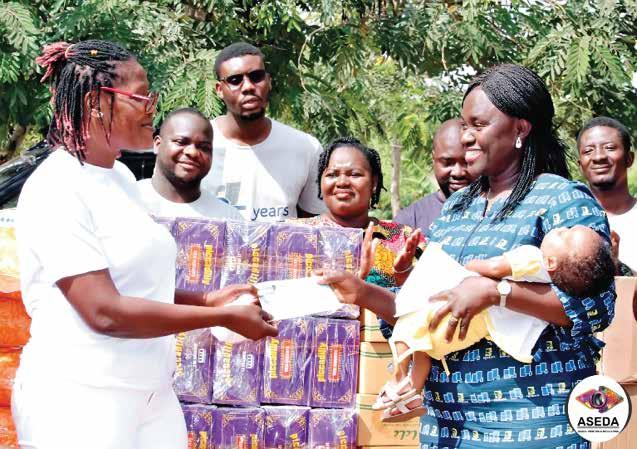
The Report: Ghana 2023 will be produced with the Association of Ghana Industries, PwC Ghana and other partners.
The Festival of Nine Lessons and Carols, featured performances by employees including Frank Akuamoah, Anointed Virtue Music, Linda Goraseh and the very exciting Sta Choir, Angelic Voices of FBNBank, who gave excellent renditions of popular Christmas and Gospel songs. There was also Dulcet, a choral group that rendered melodious music and got the employees cheering. The Exhortation, which was delivered by the Head, Commercial Banking, William Amon Neequaye called on “FBNBank’s employees and
The Report: Ghana 2023 will mark the culmination of more than a year of eld research by a team of analysts from Oxford Business Group. It will be a vital guide to the many facets of the country, including its macroeconomics, infrastructure, banking and other sectoral developments. OBG’s publication will also contain contributions from leading representatives across the public and private sectors.
The Bank, in December, also received two awards. The “Best Commercial Banking Brand” and “Best SME Banking Brand” at the 2022 Global Brand Awards Ceremony held at Dubai Palm Jumeirah-Waldorf. This was in addition to other achievements by FBNBank earlier in 2022. These include “Best Bank for SMEs” at the Connected Banking Summit West Africa Innovation & Excellence Awards, “Corporate Social Responsibility (CSR) Excellence Award” at the Health Environmental Safety and Security (HESS) award and the Bank’s induction into the Ghana Club 100.

The Report: Ghana 2023 will be available online and in print. It will form part of a series of tailored studies that OBG is currently producing with its partners, alongside other highly relevant, go-to research tools, including ESG and Future Readiness reports, country-speci c Growth and Recovery Outlook articles and interviews.
Click here to subscribe to Oxford Business Group’s latest content: http://www.oxfordbusinessgroup.com/country-reports
The crescendo for FBNBank in the activity packed December 2022, was a visit to the Royal Seed Home at Papaase on the Kasoa-Bawjiase Road in the Central Region. Cash and food items worth thousands of Ghana cedis were presented to the children of the Royal Seed Home as part of employees’ end-of-year activities. The Home has a total population of 150 children between the ages of 6 months and 19 years. Sta and Management of FBNBank extended this special goodwill as their contribution to support the Home during the festive season. Presenting the items, Grace Isaac-Aryee, Treasurer at FBNBank and leader of the delegation said “in a season like Christmas, we need to share goodwill and bring hope and joy
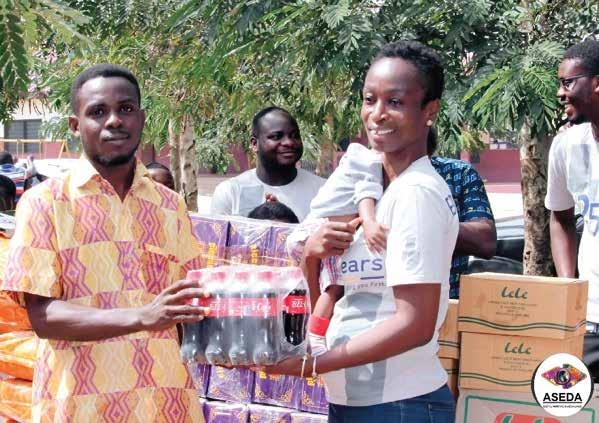
Thursday 19 January 2023 – Investment Times 2
11
may take for granted. As driven by the Bank’s brand, we have put you rst at this time and have come to spend time with you today. We have also come with our token of goodwill and friendship.”
FBNBank has in its 26 years of operating in Ghana remained focused on putting its customers and communities rst. This, it has sought to do through the rich value and excellence of what the Bank contributes to the relationship with its stakeholders as a whole, particularly the customers. FBNBank Ghana is a subsidiary of First Bank of Nigeria Limited, which is renowned for its great customer service and general stakeholder engagement garnered over its 128 years of operation. FBNBank Ghana has 23 branches and three service points plus a network of agents across the country with over 500 sta . FBNBank o ers universal banking services to individuals and businesses in Ghana.
Vodafone Cash customers to benefit from new mobile money transaction limits
A new directive by the Bank of Ghana (BoG) has introduced new mobile money transaction and wallet limits.
Customers with Daily Transaction Limits of GHC 1,000, GHC 5,000, and GHC 10,000 have had their limits increased to GHC 2,000, GHC 10,000, and GHC 15,000, respectively. Additionally, account balance limits of GHC 2,000, GHC 15,000, and GHC 30,000 have been increased to GHC 3,000, GHC 30,000, and GHC 50,000, respectively.
"With these improved trans-
Is China back?
By Yuen Yuen Ang
When President Joe Biden took o ce in 2021, his rst message to the rest of the world was: “America is back.”
Having assumed his third term as general secretary of the Communist Party of China (CPC) in October, President Xi Jinping appears to be issuing a similar proclamation.
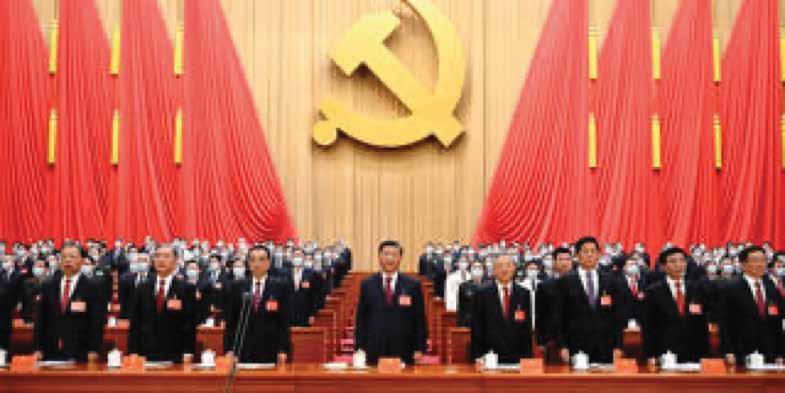
Over the past two months, China’s leadership has announced or signaled a series of major policy reversals, abruptly ending nearly three years of severe zero-COVID restrictions, easing the crackdown on tech companies and the real-estate sector, reafrming its commitment to economic growth, and extending an olive branch to the United States at the G20. With the world’s second-largest economy apparently re-opening its doors for business, investors are reacting with enthusiasm.
But, while China’s pro-business reset certainly bodes well for international trade and global peace and stability, putting the Chinese economy on the right track will require more than just a reversal of recent policies. What is really needed is bringing pragmatism and honest feedback back into the political system. As I showed in my book How China Escaped the Poverty Trap, these attributes de ned China’s famously adaptive governance during the Deng Xiaoping era.
There is a common misperception that the “China model” means top-down control by a strong, authoritarian government, anked by muscular state enterprises. In fact, 30 years of poverty and su ering under Mao Zedong proved that the combination of top-down planning, state
ownership, and political repression was a recipe for failure. That is why Deng quietly introduced a hybrid system that I call “directed improvisation.” The CPC remained rmly in power, but the central government delegated authority to numerous local authorities across China, and, at the same time, liberated private entrepreneurs from state controls.
Playing the part of a director rather than a dictator, the government in Beijing de ned national goals and established appropriate incentives and rules, while lower-level authorities and private-sector players improvised local solutions to local problems. In practice, a wide variety of local “China models” emerged, delivering transformative innovations from the bottom up, often in ways that surprised central authorities.
The rise of the digital economy is one example.
Since ideas must come before action, Deng made sure that he rst changed the CPC’s own mindset and norms. In his historic December 1978 speech launching China’s era of “reform and opening up,” he made “emancipating the mind” a top priority for the party. Under Mao, people dared not speak the truth, for fear of severe punishment, creating a chilling political climate that gave rise to disastrous policies like the Great Leap Forward. But under Deng, the new imperative was to “seek truth from facts.” Policies should be chosen because they improved people’s welfare, not because they were politically correct.
Deng’s hybrid system –top-down direction combined with bottom-up autonomy –has been overlooked both by Western China hawks and by Xi’s own leadership. When Xi
action limits, our customers will be able to transfer much more money without incurring extra charges and also keep more money in their digital wallets securely," noted David Umoh, the Director of the Central Business Unit at Vodafone Ghana.
He encouraged users with dormant or inactive accounts to reactivate their accounts to take advantage of the new wallet limits.
To help lighten the nancial burden on its customers brought on by the COVID-19 pandemic, Vodafone waived
all charges on any Vodafone Cash transfers in July 2020. The telco has continued to waive all transfer fees to any network till date, even after the implementation of Ghana's electronic transfer levy.
Mr. Umoh further explained that a key feature that sets Vodafone Cash apart from other mobile money wallets is its commitment to customer safety. In recent times, Vodafone has improved its safety features by including a simple self-reversal process for customers who accidentally send money to the wrong wallet. "With this fea-
ture, customers can easily and quickly undo a transaction without having to call customer service," David added.
To take advantage of the self-reversal feature, customers can simply select option 7 in their Vodafone Cash USSD menu, choose option 2 (self-service), enter their PIN and transaction ID, and follow the prompts. To sign up for Vodafone Cash, customers can text "register" to 558 or dial *558# for self-registration. Customers can also visit any mobile money agent or Vodafone retail shop.
came to power, he favored a di erent story about China’s success, celebrating the “institutional advantage” that a top-down command system supposedly has over Western democratic capitalism.
To be sure, a top-down approach yielded impressive results during the initial COVID-19 outbreak. Through mass testing, strict containment, and other measures that could be maintained only under a strong, authoritarian government, China achieved near-zero infections and deaths from 2020 through 2022. Xi embraced zero-COVID as one of his signature achievements, declaring as recently as the October National Congress that China would stick to the policy “without wavering.”
But then events took a rapid, unexpected turn. Exasperated with endless lockdowns, Chinese citizens from various walks of life poured into the streets in protest, forcing Xi to change his position. But the sudden reversal of the zero-COVID policy has led to a massive surge of cases and hospitalizations with which China will continue to struggle for some time.
Xi and his team are eager to put the pandemic behind them and restore business con dence. Relaxing economic regulations and ending pan-
MP urges the youth to strive hard
The Member of Parliament for Yendi on the ticket of the New Patriotic Party, Farouk Mahama, has urged the youth of the country to strive hard to achieve their set goals.

He urged the youth not to be discouraged by the temporary setback of the economy. He assured that government would do everything possible to overcome them/current challenges.
He also asked them to take ad-
vantage of the numerous skills and employment programs the government is enrolling in the course of the year to build themselves.
Hon Farouk who also serves on Food, Agriculture and Cocoa A airs and Gender and Children Committees in Parliament, was very con dent that the youth of the country would be given the necessary support to achieve their objectives.
He stated that as pillars of the state, they would not be left out in the socioeconomic de velopment of the country.
Hon Farouk, who is the board chairman of the Ghana Inte grated Iron and Steel Develop ment Corporation assured that the Corporation would work very hard to prosecute its vision for the betterment of the economy.
He expressed his gratitude to
demic controls have indeed buoyed capital markets. Moreover, after COVID-19 infections peak, domestic consumption is likely to come back with a vengeance ( ight bookings already jumped several-fold immediately after quarantine requirements for travelers were lifted), and manufacturing and logistics will return to normal. The central government has also pledged additional infrastructure spending to boost growth.
But for the new economic terrain to bear fruit over the longer term, Xi needs to reopen the political system’s feedback channels. That means setting a personal example and making clear to party-state o cials that he genuinely wants them to report the realities on the ground. That will not happen if, in practice, truth-tellers are silenced and propagandists are elevated.
The government also needs to give civil society and the media more space. It is short-sighted and ultimately self-defeating to think that quashing free speech will strengthen the CPC’s hold on power. Without a regularized system of policy feedback, governance su ers, leading to the kinds of mass protests that exploded in November and eroding the CPC’s performance-based legitimacy.
Yet another problem with Xi’s top-down approach is that it will leave investors wondering when China might pivot again. Over the past decade, Xi has repeatedly
proclaimed a devotion to various “reforms,” only to do the opposite. Empowering o cials with track records of pragmatism and candor would go a long way toward reassuring markets. Changing the political system’s criteria for recruitment and promotion would speak louder than mere slogans.
Finally, China’s leadership should recognize that the overarching goal of tackling the country’s “Gilded Age” problems, such as curbing speculative investment in real estate and protecting the rights of delivery workers in e-commerce, was not wrong. Previous policies back red because they were implemented arbitrarily, leaving businesses nervous that the party could change them at any time. Xi and his circle must practice transparency and consultation in their policymaking, rather than simply abandoning the pursuit of inclusive development.
China accumulated ample experience in adaptive governance between the late 1970s and the early 2010s. But by the time Xi came to power in 2012, Deng’s economic model had reached its limits and had begun to produce unsustainable levels of corruption, inequality, debt risks, and environmental pollution. Still, the solution can never be a return to Maoism. Rather, China needs to bring “directed improvisation” into the twenty- rst century.
Some youth in the constituency commended him for the numerous projects, programs, and op-
they would be agents of peace and development wherever they would nd themselves.
Thursday 19 January 2023 – Investment Times 3
!"#$%&"%'()*+(%*)&,"+"*(#
Breathing Life Back into COVID Prevention
By William A. Haseltine
After three long years, the pandemic shows no signs of slowing down. Unfortunately, public resistance and fatigue toward COVID-19 interventions and restrictions are at an all-time high. Even China, which was once considered a leader in virus control, has rapidly dispensed with most mitigation strategies.
COVID-19 still poses a clear and present danger. Research shows that two or more COVID-19 re-infections doubles the risk for death, blood clots, and lung damage, among other negative health outcomes. The risk of cardiovascular events has been found to increase by 4.5% up to 12 months after infection, regardless of age, race, sex, obesity, smoking, or other factors. Moreover, the latest waves of infection are being fueled by new variants that evade immunity from both vaccination and previous infections.
The good news is that we still have powerful prevention tools at our disposal. In fact, there is one widely underused strategy that doesn’t require behavioral change or restrictions, that can be used just about anywhere, and that would also help protect us against other airborne viruses, such as RSV and in uenza. It
requires investing much more in basic measures such as ventilation, air ltration, and ultraviolet germicidal light, and accelerating the exploration of newer discoveries, such as the potential use of aerosol acidity levels to inactivate certain airborne viruses.
Vaccines are highly e ective in reducing the risk of death and serious illness, but they are generally not as e ective in preventing transmission.
Mask-wearing has become so highly politicized and stigmatized in many Western countries that even some health-care workers are neglecting to wear them. Yet aerosols carrying viruses can linger for hours in the air after they have been exhaled, making it di cult to judge what counts as a high-risk situation. Given all these factors, the best way to reduce the risk of transmission is to decrease the concentration of airborne viruses that are available to be inhaled in the rst place.
We need to challenge the prevailing attitude that treats the spread of airborne pathogens in indoor spaces as an inevitable part of daily life. Unlike our ancestors, we spend almost 90% of our time indoors. For decades, governments around the world have invested heavily in food safety, sanitation, and clean drinking water – all in the name of protecting public health. In devel-
Ukraine and Africa aim to bolster economic cooperation
By Kestér Kenn Klomegâh
Despite the former Soviet republic of Ukraine for almost a year, is experiencing the worst times due to an extensive special military operation from its neighbour Russia, it has simultaneously been stepping up e orts to support Africa. During the past year, it despatched tonnes of fertilizers, wheat, grains and other agricultural products to a number of African countries, most them located in the Horn and East Africa.
In order to boost its e orts in establishing cordial working relations especially in the area of economic cooperation, Ukrainian Foreign Ministry Dmitry Kuleba last year visited a number of African countries, held useful conversations with high-powered government o cials, and plans to open diplomatic representative o ces this year inside Africa. It also plans to boost exports and participate in taking up opportunities of manufacturing o ered by the single continental market.
The overarching message in all these is to focus on engaging and expanding the expect-
ed long-term partnership, and collaboratively establish trade links. For connecting business interests between Ukraine and Africa, Ukrainians are rapidly studying more possibilities for participating in the African Continental Free Trade Area which was already agreed on, in the process, with a number of African leaders and the African Union.
Early January, Ukrainian Agrarian Policy and Food Minister Nikolai Solsky visited Senegal, where he signed a memorandum of understanding between the Ukrainian ministry and the relevant Senegalese agency on January 9, the Agrarian Policy and Food Ministry website.
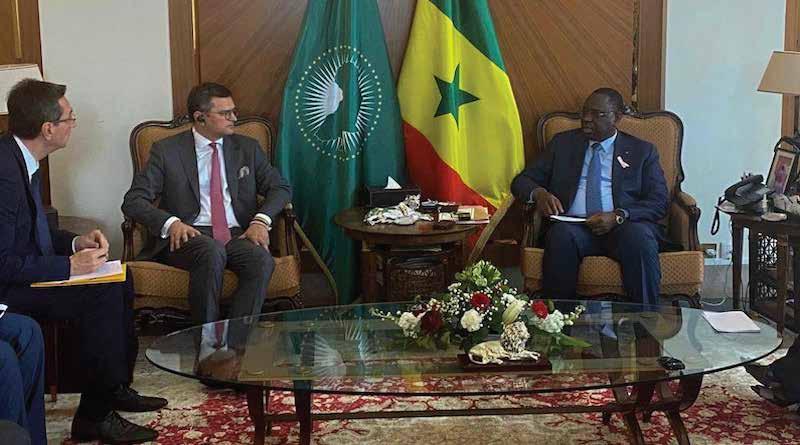
The document envisions the development of bilateral trade in agricultural produce and cooperation on scienti c studies, investments, and interrelations between Ukrainian and Senegalese government agencies and private companies. It provides for the possible storage of Ukrainian grain at so-called grain hubs. Ukraine is willing to export not only foodstu s but also other goods to African countries, which requires
oped countries, food and waterborne disease have largely been eliminated through a combination of research, legislation, the development of authoritative public-health agencies, and infrastructure funding. Why shouldn’t we give the same priority to achieving clean, pathogen-free air in public and private spaces?
Taking the ght to pathogens before they can infect us will require a multi-pronged strategy. Professional engineering bodies need to develop comprehensive ventilation standards, and new measures will be needed to ensure that these standards are met. That means establishing regulatory bodies to oversee monitoring and enforcement, not just for new construction but also in the retro tting of existing buildings. To that end, governments should help to provide specialized training for building operators and owners. The goal for all buildings should be
to recirculate the air supply of occupied spaces at a rate of at least six air changes per hour. This may sound like an enormous task. But improvements can be rolled out gradually, and strategically, across di erent sectors.
The immediate priority is to ensure pathogen-free air in hospitals and health-care settings, to protect vulnerable patients, and in airplanes, to stop the rapid spread of new variants around the world.

After that, our focus should shift to public transportation, including trains and buses, and then to o ces, schools, and daycare facilities. In addition to preventing viral transmission, better-ventilated areas have been shown to improve children’s cognitive performance and reduce illness-related absenteeism. Finally, we should address ventilation in individual homes and residential buildings.
Critics of such proposals will cite the up-front cost as a barrier. Yet even an average u season is
known to cost the United States $11.2 billion,
According to an August 2022 Brookings Institu-
long COVID may be “keeping as many as four million people out of work” in the US, at an annual cost of $170-230 billion per year in lost wages.
Having a workforce that is repeatedly getting sick means that we are accepting continued disruptions across all industries. But this is unsustainable. Parents are already exhausted and overwhelmed by the “tripledemic” (in uenza, RSV, and COVID-19) that has been tearing through schools and daycares.
Beyond the direct nancial costs, the trauma and turmoil in icted by the pandemic make it clear that investing in pathogen-free indoor air is not only the most economically sound option but also the most ethical one. Like other e ective investments in public health, this one would soon pay for itself.
The National Democratic Congress (NDC) Parliamentary Minority Caucus has called on President Nana Addo Dankwa Akufo-Addo to suspend the ongoing Domestic Debt Exchange Programme.
Mr Haruna Iddrisu, the Minority Leader and Member of Parliament for Tamale South, at a press conference in Parliament on Monday, urged the President to engage in more comprehensive consultations on the matter with stakeholders.
“We call on all stakeholders for a national dialogue on the state of our economy and exchange programme with the view to achieving the most workable and least punitive steps that protect Ghanaians and households from the disastrous e ects of the Domestic Debt Exchange Programme as currently designed,” he said.
“We wish to take this opportunity to indicate our intention to embark on nationwide road shows to foster deeper understanding of this matter and rally Ghanaians to demand a more favourable resolution to the economic crisis ….”
Mr Iddrisu said he was registering the Minority’s dissatisfaction with the Government Debt Exchange Programme that was threatening the survival of the nation’s nancial sector.
“Today, Ghana is rated alongside Sri Lanka and Lebanon…. It is no secret that Ghana today is in debt Distress. This has been conrmed by both the nance minister and the International Monetary Fund (IMF),” he said.
Shortly after the presentation of the 2023 Budget Statement, the Finance Minister, on 4th and 5th December, 2022 also announced to the whole world that “There will be no haircut on the bonds and the principal at individual holders of bonds will not be affected,” he said.
Mr Iddrisu talked about the sudden U-turn to include individual bond holders and that it was trite knowledge that substantial number of moneys in nancial institutions came from private individuals.
It was, therefore, not acceptable for the Finance Minister to say that nancial institutions would be a ected by the Debt Exchange Programme but individual bonds holders would not. He said the Programme would further exacerbate the already
perilous nancial sector as banks and other nancial institutions were still reeling under the infamous nancial sector bailout.
He said the last thing Ghanaians would want was a total collapse of the nancial sector due to government’s excessive borrowing.
Mr Iddrisu said the future sustainability of nation’s insurance companies could not be guaranteed under the current crafting of the Debt Exchange Programme.

“Indeed, the Programme, as proposed and implemented now cannot be in the interest of our nancial institutions and insurance companies. It certainly is not in the best interest of Ghanaians,” he said.
He said it was on that score, that the Minority was calling on the Government to immediately suspend the Programme and engage in deeper consultation for transparency on Ghana’s total debt and its management.
“Ghanaians deserve to know how much was involved and how long the debt exchange would take. It is not just about people’s investment, but more about people’s lives and livelihood”. Source:
Thursday 19 January 2023 – Investment Times 4
owing to the resulting absenteeism and reductions in productivity.
tion report,
! !"#$%&"%'()*+(%*)&,"+"*(#
GNA ! !
Co-principal investigator for CREATE and consultant family physician at Korlebu Teaching Hospital, Dr. Roberta Lamptey has advised Ghanaians to pay attention to non-infectious diseases as they are becoming more common in Africa.

Speaking at the CREATE Ghana meeting held at Accra City Hotel where CREATE collaborators, the ministry of health, representatives from hospitals and various health related elds met to deliberate on integrated care for people living with multiple long-term conditions, she said that the most common non-infectious diseases are cardiometabolic diseases.
“In Africa, when asked to mention fatal diseases, names such as Ebola and Covid quickly comes up. Across media platforms, there are always precautionary messages on these. This is because African healthcare systems were developed to focus on infectious diseases; and in Ghana, it is no di erent. While this may not be bad, it however means that African healthcare is better set up to cope with infectious diseases than non-infectious diseases. But lately non-infectious diseases are becoming more common in Africa; with the most common being cardiometabolic diseases. These include heart disease, diabetes, obesity and high blood pressure”.
“According to World Health Organization (W.H.O), 1.5 million deaths are directly attributed to diabetes, each year while about 17.9 million deaths each year are caused by cardiovascular diseases (CVDs), making it the leading
Every home in Ghana has one or more persons with cardiometabolic disease - Dr. Roberta Lamptey
that every home in Ghana has 1 or more persons with any or more of the above-mentioned conditions. Increasingly, people below 40years have to learn how to live with multiple chronic long-term conditions such as strokes, obesity, hypertension and diabetes”, she added.
Dr. Roberta Lamptey men-
cardiometabolic disease in Africa (CREATE) to help change the trends in Africa and Ghana.

“To change the trends in Africa and Ghana, CREATE has brought together researchers and doctors from Ghana, Kenya and Mozambique, to determine what healthcare needs are most important to patients and health workers in these countries. CREATE Ghana
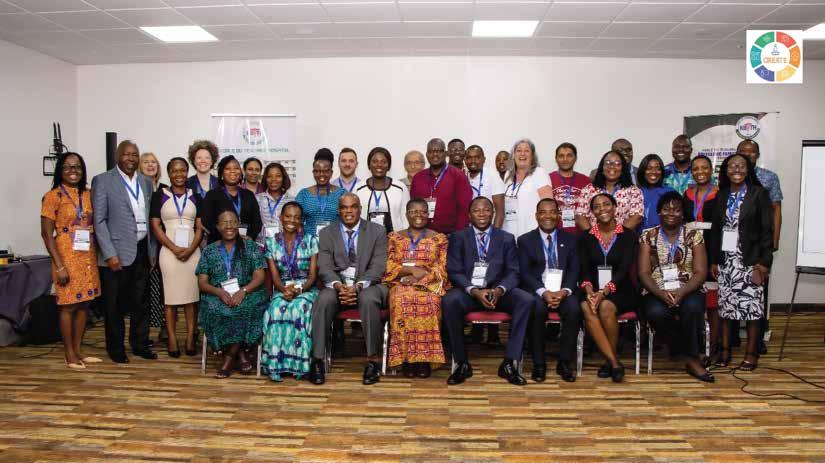
can be used to provide better health care to patients with cardiometabolic diseases; in particular, those living with multiple long-term chronic conditions”.
“Recruitment of patients living with chronic long term cardiac diseases and data collection processes for a feasibility trial to test a self-man-
agement education model, developed by the CREATE Collaborators is planned for this quarter after the necessary ethical approvals have been obtained. This may ultimately strengthen Ghana’s health system in providing integrated care for chronic conditions”, she concluded.
CREATE is funded by the National Institute for Health and Care (NIHR, UK).
Executive Chairman of the Jospong Group of Companies (JGC) has attributed the success story of his group to God.
According to Dr. Joseph Siaw Agyepong, God has been his guide and pillar throughout the JGC's journey so far.
The JGC, he contended, is founded on the principles of God and people, stressing that the group's "primary goal is to improve the lives of people."
Dr. Siaw Agyepong was speaking at the opening of the 2023 Jospong Leadership Conference (JLC) on Wednesday, January 18, 2023, at the Pentecost Convention Centre (PCC) at Gomoa Fetteh in the Central Region.
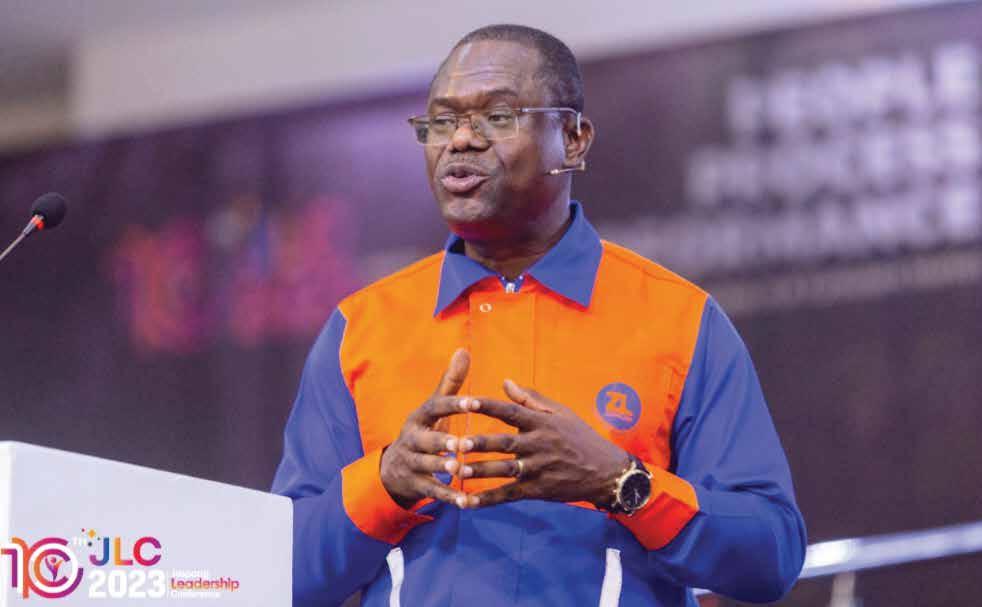
The ve-day conference, which is being participated by over 1,000 directors, managers, senior ocers among other sta members of JGC, is on the theme: People, Process & Performance --The Pathway to Success in a Turbulent Market."
This year's conference marks the 10th anniversary of the JLC series.
Dr. Siaw Agyepong indicated that throughout his business life, he has consistently seen that the God factor triumphs over all challenges adding "I am always grateful to God."
"When I face any challenges, I go down on my knees with my wife and pray and God has been so good to us.
We feel so blessed by God Almighty," he gratefully expressed.
The mission of the JGC, he said, is to be the leading environmental sanitation management company in Africa, with its vision aimed at "improving the lives of people and their environment."
In this regard, he encouraged his sta members to be prayerful in all endeavours, and to work hard to improve the lot of people.
Recounting how far the JLC has come since its inception in 2013, tthe Executive Chairman of JGC said the leadership conference started as retreats.
"It is amazing how time ies. Ten years ago, speci cally in 2013, we started this journey in the form of retreats at the Presbyterian Women’s Centre, Abokobi, Accra. The rst retreat was held in January with the theme: “Seeking God’s guidance on the perfect will of God”, and the second in July under the theme; “Let’s Build Together.”
...The objective was to discuss our plans and activities for the year. It was attended by many employees and stakeholders from all over the country. And the keynote speaker was the then Managing Director for Stanbic Bank, Chief Alhassan Andani," he recalled.

The outcome of the retreats, Dr. Siaw Agyepong noted, led to the creation of the Group O ce and
many other remarkable achievements.
"The 2013 January and July retreats thus became a de ning moment for the Group," he stressed.
He thus seized the opportunity to commend, especially President Nana Addo Dankwa Akufo-Addo, for his leadership guidance and support for his group.
He was equally full of praise for the Minister of Sanitation and Water Resources, Mrs. Cecilia Abena Dapaah, and others within his group's operational activities, and all the sta members of JGC for their hard work and sacri ces.
"We have come this far because of the critical role played by every sta of JGC," he asserted.
The Guest Speaker, Reverend
Sam Adeyemi, a Nigerian clergy and motivational speaker, in a presentation christened: "Celebrating the Champions in People", said transformational leaders empower employees with praise and appreciation.
He said there was nothing like a "perfect employee" in this world, insisting that leaders must rather leverage on the skills and talents of people.
"Leadership is not about titles and egos but one that must make champions in the people," he said
According to the man of God, a leader must help people to overcome fear, low-self esteem, complacency, self-doubt, bad attitude and procrastination.
"When you are a leader avoid speaking negative things about your people," he advised.
Thursday 19 January 2023 – Investment Times 5
!"#$%&"%'()*+(%*)&,"+"*(#
The
We followed due process in serving notice of tax assessment on MTN Ghana – GRA
The Ghana Revenue Authority (GRA) says it followed due process in serving a notice of tax assessment on MTN Ghana.
It said it had also engaged MTN Ghana as required by law to ensure that it communicated
the basis of the assessment.
A statement issued in Accra by Mrs Florence Asante, Assistant Commissioner-Communication and Public A airs, GRA, said the Authority used other several avenues to interact with
them about their right to object to any tax decision by the Commissioner-General.
On January 10, 2023, the GRA served Notice of Tax Assessment on MTN, which the Company reacted to.
MTN Ghana “strongly” disputed the accuracy and basis of the assessment, including the methodology used in conducting the audit.
The Company said it believed that the taxes due had been paid during the period under assessment and had resolved to defend its position on the assessment.
The GRA reminded taxpayers and the public that its mandate
in tax administration was derived from the Ghana Revenue Authority Act 2009, (Act 791), the Revenue Administration Act 2016, (Act 915) and several other tax laws.


It said Section 36 of the Revenue Administration Act 2016, (Act 915), mandated the Commissioner-General to audit the tax a airs of a person; and it was in accordance with that provision that the Authority conducted a Tax audit on MTN Ghana for the tax period 2014 to 2018.
“The audit was conducted as required by law adhering to the principles of fairness and transparency,” it added.
Section 42 of Act 915 also pre-
scribes the ways in which a person can object to a tax assessment that is served by the Commissioner-General.
GRA said admittedly, MTN Ghana had been audited many times in the past and had received numerous awards as a compliant taxpayer; however, those did not in any way prejudice the conduct of audits as required by Law.
“GRA uses this opportunity to remind taxpayers of their obligations under the tax Laws to declare and pay the right amount of tax(es) as well as the mandate of GRA to ensure that all businesses pay the right amount of tax,” it added.
Thursday 19 January 2023 – Investment Times 6
!"#$%&"%'()*+(%*)&,"+"*(#
Human values for Artificial Intelligence
By Ana Palacio
This may be the year when arti cial intelligence transforms daily life. So said Brad Smith, President and Vice Chairman of Microsoft, at a Vatican-organized event on AI last week.
But Smith’s statement was less a prediction than a call to action: the event – attended by industry leaders and representatives of the three Abrahamic religions – sought to promote an ethical, human-centered approach to the development of AI.
There is no doubt that AI poses a daunting set of operational, ethical, and regulatory challenges. And addressing them will be far from straightforward. Although AI development dates back to the 1950s, the technology’s contours and likely impact remain hazy.
Of course, recent breakthroughs – from the almost chillingly human-like text produced by OpenAI’s ChatGPT to applications that may shave years o the drug-discovery process – shed light on some dimensions of AI’s immense
potential. But it remains impossible to predict all the ways AI will reshape human lives and civilization.
This uncertainty is nothing new. Even after recognizing a technology’s transformative potential, the shape of the transformation tends to surprise us. Social media, for example, was initially touted as an innovation that would strengthen democracy but has done far more to destabilize it by facilitating the spread of disinformation. It is safe to assume that AI will be exploited in similar ways.
We do not even fully understand how AI works. Consider the so-called black box problem: with most AI-based tools, we know what goes in and what comes out, but not what happens in between. If AI is making (at times irrevocable) decisions, this opacity poses a serious risk, which is compounded by issues like the transmission of implicit bias through machine learning.
The misuse of personal data
and the destruction of jobs are two additional risks. And, according to former US Secretary of State Henry A. Kissinger, AI technology may undermine human creativity and vision as information comes to “overwhelm” wisdom. Some worry that AI will lead to human extinction.
With stakes this high, the future of the technology cannot be left to AI researchers, let alone tech CEOs. While heavy-handed regulation is not the answer, the current regulatory vacuum must be lled. That process demands the kind of broad-based global engagement that is increasingly shaping e orts to combat climate change.
In fact, climate change o ers a useful analogy for AI – far more useful than the oft-made nuclear comparison. The existence of nuclear weapons may a ect people indirectly, through geopolitical developments, but the technology is not a xture of our personal and professional lives; nor is it shared globally. But climate change, like AI, affects everyone – and action to limit it could put a country at a disadvantage.
Already, the race to dominate AI is a key feature of the US-China rivalry. If either country imposes limits on its AI industry, it risks allowing the other to pull ahead. That is why, as with emissions reduction, a cooperative approach is vital. Governments, together with other relevant public actors, must work together to
design and install guardrails for private-sector innovation.
Of course, that is easier said than done. Limited consensus on how to approach AI has resulted in a hodgepodge of regulations. And e orts to devise a common approach within international forums have been stymied by power struggles among major players and the lack of enforcement authority.
But there is some promising news. The European Union is working to forge an ambitious principles-based instrument for establishing harmonized AI rules. The AI Act, expected to be nalized this year, aims to facilitate the “development and uptake” of AI in the EU, while ensuring that the technology “works for people and is a force for good in society.”
From adapting civil-liability rules to revising the EU’s product-safety framework, the act takes the kind of comprehensive approach to AI regulation that we have been missing.
It should not be surprising that the EU has emerged as a frontrunner in AI regulation. The bloc has a history of leading the way in developing regulatory frameworks in critical areas. The EU’s legislation on data protection arguably inspired similar action elsewhere, from the Consumer Privacy Act in California to the Personal Information Protection Law in China.
But progress on global AI regulation will be impossible without the United States. And, despite its shared commitment with the EU to developing and implementing “trustworthy AI,” the US is com-

mitted to AI supremacy above all. To this end, it is seeking not only to bolster its own leading-edge industries – including by keeping the red tape to a minimum – but also to impede progress in China.
As the National Security Commission on Arti cial Intelligence noted in a 2021 report, the US should be targeting “choke points that impose signi cant trickle-down strategic costs on competitors but minimal economic costs on US industry.” The export controls that the US imposed last October, which target China’s advanced-computing and semiconductor sectors, exemplify this approach. For its part, China is unlikely to be deterred from its quest to achieve technological self-su ciency and, ultimately, supremacy.
Beyond opening the way for AI-generated risks to manifest, this technological rivalry has obvious geopolitical implications. For example, Taiwan’s outsize role in the global semiconductor industry gives it leverage, but may also put yet another target on its back.
It took more than three decades for awareness of climate change to crystalize into real action, and we still are not doing enough. Given the pace of technological innovation, we cannot a ord to follow a similar path on AI. Unless we act now to ensure that the technology’s development is guided by human-centric principles, we will almost certainly regret it. And, as with climate change, we will most likely lament our inaction much sooner than we think.
Improving employee performance through performance management system
Hurray, happy New Year afehyiapaa to both employers and employees, as we get back to work in 2023 after the end of year and new year recess. In all organization, employees are the greatest assets. After taking stock of the organization’s successes and failures during the previous year, the organization through supervisors set target or goals at the beginning of the year for employees to enable them work towards these goals throughout the current year. Mostly these goals are set in relation to the organization’s vision and mission.
A target is a goal to be achieved within a given period. Mostly a target is the problem area in an organization that needs to be eliminated. Setting target requires an agreement between a supervisor (appraiser) and his or her subordinate known as (appraisee). Having a meeting at the beginning of a current year where the appraiser or supervisor give a work schedule upon agreement to the appraisee or subordinate. The purpose of this agreement is to motivate and support the employee with the needed resources in planning his or her work in the year. Example a credit o cer of a bank is given a target by his supervisor to cut o 30% of debtors’ rate by 31st July, 2023. For an HR ocer, a target for example can be to, submit monthly HR report by fth working day of
ensuing month in 2023. One of the HR tools used in most organizations nowadays to measure the performance of the employees is the Performance Management System (PMS). A performance Management System is a process an organization follows to ensure employees know the roles they play and the objective needed to follow to become successful. There are three phases of the performance management system, also referred to as cycle because these phases are unending process, these include, • Setting target at the beginning of year.
The rst phase, which is setting the target, is a meeting between the supervisor (appraiser) and the subordinate (appraisee) to discuss and agree on a target for the subordinate in many instances at the beginning of the year concentrating on target, competency and result areas.
Competency is an inmate or something within a person that promote performance. For instance, in the case of the credit o cer above, one of his competencies could be e ective portfolio administration or ability to conduct loan evaluation.
It should be noted that we have three types of competences this will be discussed in details in the next write-up.
Result Areas, is the area in the organization that needs improvement. In the case above on credit o cer, the key result area is debt collection meaning
both the supervisor and the subordinate (credit o cer) in setting the target for the subordinate realized there is a need to minimize debtors’ rate to 30%.
A good target should be SMART that is: S- Speci c, MMeasurable, A-A-agreed, R- Realistic and T- Time-bound. Speci c target means it should be so easy to understand when stating the target so that you know what exactly is to be accomplished. Using the credit o cer, it was speci c on debtors’ rate.
Measurable, a target should be easy to measure so that one can tell whether is achieved or not at the end of the period given. Here again using the credit o cer 30% was to be cut o .
Agreed or achievable, here, both the appraiser and appraisee must discussed and come to an agreement during the target setting period to motivate and ensure commitment from the appraisee. From the above case both the supervisor and subordinate agreed on 30% reduction so, the appraisee will be happy because he or she was part of the decision-making.
Realistic, is expected that when setting target, appraisers should consider resources available upon existing challenge. Constraints should not make it too di cult or easy to achieve what is expected. Time- bound: The period given during the target settings
makes it easy to know when to measure the target achievement. The credit o cer’s target, 31st July,2023 is the deadline to measure achievement.
• Mid-year or quarterly target reviews
Midyear or quarterly reviews is a meeting between the supervisor and the subordinate to review target set during beginning of year and also discuss matters relating to it. This enables the subordinates to get feedback on his or her performance from the supervisor whilst the supervisor take note of what resources are needed or recommends strategies to achieve the set targets.
• End of year target review and appraisal
The nal phase is the End of Year Review and Appraisal. This is also another meeting between the supervisor (appraiser) and the subordinates (appraisee) to assess the overall performance of the subordinates on the target set during the beginning of the review period. In doing this rating or marks is awarded on each target set for the appraisee. Appraisal is the last thing given to the appraisee by the appraiser during the end of year review meeting in the last phase of the performance management system at the end of a particular year.
EFFECT ON THE EMPLOYER
Most of the organization’s HR department use the performance management systems as a means to provide incentives to the employee. In many instances, this is

through awarding Salary increment based on end of year’s performance in relation to the organizations pro t performance in the year under review.
During the review meeting the weaknesses identi ed by the appraiser is used to plan for training programs to help the appraisee overcome his or her challenge. Furthermore, from result of the appraisee’s performance record a decision may be taken by the organization to promote the appraisee.
EFFECT ON THE EMPLOYEE
It is through the performance review exercise that, employees are motivated to improve on their performance as against the expected performance level.
An employee receives feedback on his or her performance and during the conversation time between the supervisor(appraiser) and the subordinate(appraisee) on strength and weaknesses in skills, behavior, knowledge, attitude etc, are made known to the employee, so to put in e ort to improve on areas where the need be.
From the performance review exercise, employee’s career development can be enhanced because the employee gets to know where his/her strength is, whiles putting in e orts to do away with bad behaviors and attitude that works against achieving the employee’s work target.
AUTHOR: JULIANA AMOAH FORESTRY COMMISSION
Thursday 19 January 2023 – Investment Times 7
Spin-O show.
Dr Pepera explained that ovarian cancer is commonly known as the "silent killer" because it does not often present any symptoms. According to her, by the time it presents with symptoms, cancer would have already advanced. She said that some
visit the doctor if one notices any changes in their body. Speaking on cancer of the womb, also known as uterine cancer, Dr Pepera said womb cancer is one of the more treatable cancers. She said that this type of cancer usually causes bleeding, so if this symptom is noticed early and taken serious-
cinating for it."
Cervical cancer, she said, happens when cancer forms in the tunnel-like organ that connects the vagina and the uterus, known as the cervix. The human papillomavirus, or HPV, is frequently the cause of this cancer, she noted.
Dr Pepera recommended that
Vodafone Healthline doctor educates Ghanaians on cervical, ovarian, and uterine cancers

women get vaccinated against HPV to reduce the risk of getting cervical cancer. She also said that the best time to get vaccinated is during adolescence and suggested that both boys and girls should get vaccinated so that the entire population will be immune to HPV.
During the Myth Buster segment, the in-house doctors, Dr Kweku Yalley and Dr Aba Folson discussed a di erent type of cancer known as oral cancer. The doctors explained whether oral sex could cause oral cancer. The doctors noted that oral sex can predispose one to oral cancer.
Dr Yalley also mentioned that
It’s time we make systemati c effort towards self-sufficiency
—President Akufo-Addo
President Nana Addo Dankwa Akufo-Addo has underscored the need for Ghana to make a systematic and conscious e ort towards self-su ciency.
According to him, developing Ghana’s self-su ciency and its food security was one major challenge.
However, he bemoaned the fact that a lot of money was spent on importing, especially foodstu s, into the country.
“We spend a lot of our money importing foodstu s into Ghana, and it has been going on for too long. And I think now is the time that we are going to have to make this systematic e ort to be self-su cient and depend on ourselves for things that we eat,” he said.
President Akufo-Addo made the statement when he received a delegation of investors from Thailand, led by the Executive Chairman of the Jospong Group of Companies (JGC), Dr. Joseph Siaw Agyepong, and the Honorary Consul of Ghana in Thailand, Dr. Sicha Singsomboon, on Friday, December 30, 2022, at the Jubilee House, the seat of government.
The delegation, who comprised some twenty (20) investors, were in Ghana to cement a Ghana-Thailand Rice Project being spearheaded by the JGC, and to also explore other possibilities of investing in Ghana’s
agriculture sector.
The President expressed excitement at the partnership and collaboration between Ghana and Thailand in the rice sector.
“Countries like yours [Thailand] and others have done it. And if you have done it, others can also follow and emulate your example. And I am excited by the idea of getting into bed with people who are known to have succeeded,” he expressed.
In learning from Thailand, President Akufo-Addo was upbeat that Ghana will be moving towards a system of agricultural inputs that will reduce its dependence on agricultural chemicals imported from countries such as Russia and Ukraine.
“…and now we are going to be dealing with organic fertilisers, which is better for our soil, better for our pockets and generally as environmentally friendly and conducive than what we have been using up till today,” he noted.
“And if we are able to develop that here in Ghana, it will mean that we would not have to worry ourselves importing inorganic fertilisers from Ukraine and Russia so too much and be dependent on others,” he said.
He, therefore, tasked the Thai investors to endeavour to have some concrete understandings and arrangements with the various stakeholders in Ghana’s rice sector and agriculture industry in general.
He explained that this would bring forth a roadmap on how the two countries will grow and develop this relationship.
“But it is something that will be extremely bene cial to our country. We want to be able to work very closely with you to achieve our common goals. You have your new market to develop, and we also have our development that makes sense for our future. So let’s hold hands and do something pro table for you and for us,” President
Earlier, the delegation paid courtesy visits to the Ministers of Finance, Ken Ofori-Atta; Foreign A airs and Regional Integration, Ms. Shirley Ayorkor Botchwey; Food and Agriculture, Dr. Owusu Akoto Afriyie, and; Trade and Industry, Alan Kwadwo Kyerematen.
All the four ministers assured the investors from Thailand of government’s support to ensure that the Ghana-Thailand rice project becomes successful.
while oral sex is not linked to oral cancers, it is important that people be sexually responsible and avoid multiple sexual partners.
Through the Vodafone Healthline show, Vodafone Ghana has provided free medical education and interventions to the Ghanaian public. The show keeps giving out useful information through interesting content on selected media outlets and social media.

The Vodafone Healthline Spin-O edition airs on UTV on Mondays from 9:30 p.m. to 10:00 p.m. and on DGN on Tuesdays from 6:00 p.m. to 6:30 p.m.
Early in 2022, the JGC commenced its integrated rice farming project. And in showing the seriousness JGC attached to the project, a team led by Dr. Siaw Agyepong visited Thailand to understudy the Thai rice sector in order to replicate their experiences and strategy in Ghana.
The object of JGC was to partner with major rice industry players in Thailand to provide technical and equipment support for the entire rice value chain in Ghana with the aim of boosting rice production in Ghana.
Thursday 19 January 2023 – Investment Times 8
Housing A Reality In Ghana
eco-friendly, and 50 times cheaper compared to the conventional concrete house. Now is the time for us as Ghanaians and Africans at large to embrace these innovations reinvented by 66 Engineering to build that enviable motherland of African states for ourselves and posterity.

ever materialized in Ghana where several attempts to build citizens of the state failed for decades? The evidence is so glaring as we keep recording huge housing population census conducted since independence. The Ghana Population and Housing Census of about 1.8million. The ripple dramatic increase in slum communities, unapproved settlements, and substandard residential structures across major cities in Ghana particularly Accra. The state tried to change the trajectory, so did the private sector but all to no avail.
The good news however bad the situation may be today is that, 66 Engineering Ltd has reinvented the science, art and engineering of building standard residential houses that cost less than Ghs 60,000 in the capital city Accra, and even much more less in the other regions across the country.
2 | P a g e
At 66 Engineering, we provide our clients with several alternatives and opportunities of building standard yet building cheaper residential homes that every of one’s income level or class of society.
The project in picture in this publication is one of our projects in Accra that has become the cynosure of all eyes for the past few weeks we erected this structure. This is one of our interlocking brick’s cheaper building solutions.

The bricks by designed have two (2) round holes and a small rectangular perforation in the middle. These holes are purposely for mortar joints and in some cases serves as conduits for plumbing pipes, electrical cable pipes, bamboo or iron reinforcement.


Remember the technology is not bricks that have been in the system that we all know. This technology is in the family of the stabilized compressed earth. It is a ratio of cement, clay or laterite, in some cases giving us a brick with average compressive strength of 8Mpa far higher than the average industry compressive strength
requirements of a concrete block. The structure does not require plastering after building, no painting, (you can only polish it if onlyent color designs). Color of the house can be kept consciously by a selective choice of the clay or laterite or a mixture of the two, the building maintains an environmentally friendly temperature that there will be no need to spend a dime on air conditioner installation and the electricity to power them. Alternatively, one can garnish this structure with natural stone décor marbles to give it that luxurious taste.
The interior can be plastered depending on the taste and preference of the individual, or better still be sealed and polished with a special varnish cheaper than plastering and painting. Ceiling and lamp holders can be processed bamboo which is a local content input and environmentally friendly
bamboo tiles et cetera ect cetera. The reality is that, you end up having a complete house with sound and superiorstructural integrity,
By this publication, we are therefore calling on all stakeholders in the building, construction and real estate industry, all governments in the African continent, regulatory bodies, civil society 3 | P a g e organizations, international and regional associations, non-govern mental organizations et cetera to rally behind this clarion call by patronizing these innovations reinvented by this young company (66 Engineering Ltd), and also spreading the good news across the length and breadth of Africa. We are also appealing to all interna tional bodies such as the World Bank, International Finance Corporation (IFC) through the EDGE initiative, the ECOWAS community, African Union, the African Continental Free Trade Area Secretariate for partnerships, inves that 66 Engineering can do mass production of these GREEN BUILD ING TECHNOLOGY housing in gated estate communities to put shelter over the heads of the homeless majority of African people in our homeland Africa. You can reach us on: www.66engineering.com or send us a mail via 66engineeringgh@g mail.com for further information. Remember that the future is always built today and not tomor row. Imagination is our hallmark at 66 Engineering. Do not sit on the fence, join the revolution now!. 66 Engineering: Bringing Imag ination to Reality!
Writer: DANIEL KONTIE Position: Managing Director (66 Engineering Ltd) Contact: +233209032280
Thursday 19 January 2023 – Investment Times 9





Thursday 19 January 2023 Business Loans For all your business loans, visit any of our 114 branches nationwide or talk to us on 0302-21 6000 TERMS AND CONDITIONS APPLY Te l: +233 (0)302 21 600 0 www. cbg .com.gh cbgba nkl td
-((.,/&+$0.(*&0('"(-&120 -((.&(%#"%3 4567589 :; <=<>
-((.,/&+$0.(*&0('"(-&120 -((.&(%#"%3 4567589 :; <=<>
+$!02(!2%2+"!&"%#"!$*20) "#$ %&%% '() '*+,-. %/01 234*564!'()!'*+,-.!7+*!%&%% #/81 %&%% )*+94:-4;!'() '*+,-. #/<1 =+'!)+>?:@!A5-4! %</&&1 B44C>@!DE-4*F5EC!DE-4*4G-!A5-4 %8/%H1 DE7>5-?+E!7+*!(4:$!%&%% 8I/H1 JE;!)4*?+;!DE7>5-?+E!K5*64-! %&%% %M/81 =N;64-!(47?:?-!O1!'()P! Q4R$!%&%% S I1 %&%% =N;64-!(47?:?-!K5*64-!O1'()P S S1 )NF>?:!(4F-!OF?>>?+E!'TUP!! Q4R$!%&%% IS</I (4F-!-+!'()!A5-?+! Q4R$!%&%% <8/01 )*2!.&+$0.(*&0('"(K.4!'.5E5!Q-+:C!JV:.5E64 :>+G4;!>+,4* 7+*!-.4 ,44C +E!-.4!F5:C!+7! W+34W4E-G F@! I :+NE-4*G/ K.4 'QJ!X+WR+G?-4!DE;4V!O'QJ XDP >+G-!8/H<!R+?E-G! O &/%H1P!-+! :>+G4 5- %$I#M/<I R+?E-G$ *47>4:-?E6 5! @45* -+ ;5-4!OZK(P!>+GG +7 &/%H1 K.4 'QJ


\5*C4-!:5R?-5>?]5-?+E ?E:*45G4; F@! &/!-+!:>+G4! -.4!,44C!5-! 'TUSI$S&</0H W?>>?+E$ 7*+W 'TUSI$8MS/I< W?>>?+E!5-!-.4!:>+G4!+7!-.4!R*43?+NG! ,44C/!K.?G!*47>4:-G!5!ZK(!5RR*4:?5-?+E +7!&/HS1/!







K*5;?E6!5:-?3?-@!*4:+*;4; 5 -+-5>!+7 %SI$%<S G.5*4G! 35>N4;!5-!'TUI#&$<I#/S8 :.5E6?E6 .5E;G$ :+WR5*4;!,?-. H%I$H0< G.5*4G$ 35>N4; 5'TU%$&<<$88</IM ?E -.4!R*4:4;?E6!,44C/ X2^ ;+W?E5-4;! 3+>NW4 +7!-*5;4G 7+*!-.4!,44C ,.?>4G! J'T ;+W?E5-4;!35>N4!+7!-*5;4G 7+*!-.4! ,44C$! 5::+NE-?E6!7+* 8#/S81 5E;!8#/I#1 +7!G.5*4G! -*5;4;!*4GR4:-?34>@/ K.4!W5*C4-!4E;4; -.4!,44C!,?-. % 5;35E:4*G 5E;! % ;4:>?E4*G

Thursday 19 January 2023 – Investment Times 11 !"#$%&"%'()*+(%*)&,"+"*(#
5G!?E;?:5-4;!+E!-.4!-5F>4!F4>+,/!_ ?8@AB&&+CDB8E&FC8&GHB&-BBI (J7@G9 2KB6@6L& ?8@AB&&&&&&&&&&& !MCE@6L& ?8@AB& 35@6N,CEE OPQ '^( %%I %8& !HH/SH1 K`K2^ I I/&H !&/%81 abD^ #/MM #/8 "0/<01 X2^ &/S8 &/S "</S01 "#$%&'(!)*+,+!"-#&.!/0&*+,1' H$M&& H$0&& %$&&& %$H&& %$%&& %$#&& %$I&& %$8&& &#c&Hc%# &Ic&Hc%# &8c&Hc%# &Sc&Hc%# &<c&Hc%# &Mc&Hc%# &0c&Hc%# H&c&Hc%# HHc&Hc%# H%c&Hc%# H#c&Hc%# *8B6R&@6&+58IBG&"6R@ABE& =>=; !"#$%& !"#$'"& "#$%#& "#$'(& "#$'#& "#$)(& "#$)#& "#$#(& #$##& #%*#)*'% #+*#)*'% #(*#)*'% #,*#)*'% #-*#)*'% #.*#)*'% #/*#)*'% )#*#)*'% ))*#)*'% )'*#)*'% )%*#)*'% /*#&?B8FC8T56AB&CF&3)(&+58IBG& "6R@ABE 012!34 012!514 !" !(#6### !)##6### !)(#6### !'##6### !'(#6### !%##6### !%(#6### !+##6### #/*#)*'% )#*#)*'% ))*#)*'% )'*#)*'% )%*#)*'% 'CM7TB&56R&'5M7B&CF&*85RBE&FC8&-BBI& (6R@6L&:;N>:N=>=; !789:;2 7<9:2
!U00(%!/&+$0.(*


K.4!X4;? ,45C4E4;!565?EG-!-.4!aQ( 7+*!-.4 ,44C/ D-! -*5;4;!5- 'TUH&/##8<cd$!:+WR5*4;!,?-.! 'TU0/&&I<cd!5-!,44C!+R4E$ *47>4:-?E6!,c, 5E;! ZK( ;4R*4:?5-?+EG +7! H%/MM1! 5E;! H</! *4GR4:-?34>@ K.?G!:+WR5*4G!,?-.!ZK(! ;4R*4:?5-?+E!+7!&/&&1 5!@45*!56+/ K.4!X4;? G?W?>5*>@ ,45C4E4; 565?EG-! -.4!'=) 7+*! -.4 ,44C/!D- -*5;4; 5- 'TUH%/SHMIce$ :+WR5*4;! ,?-.!'TUH&/MH<Ice!5-!,44C! +R4E$!*47>4:-?E6!,c, 5E; ZK( ;4R*4:?5-?+EG +7 HI/%<1! 5E;! HM/%M1! *4GR4:-?34>@/!K.?G :+WR5*4G!,?-.!ZK(! ;4R*4:?5-?+E +7!H/HH1!5!@45*!56+/




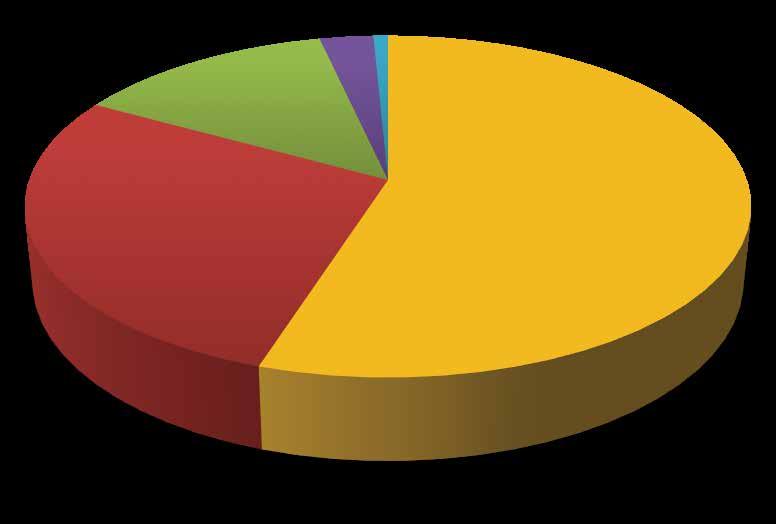




K.4!X4;? 565?E!>+G-! 565?EG- -.4!JN*+ 7+*!-.4!,44C/! D- -*5;4;!5-!'TUHH/H0H8cf$!:+WR5*4;!,?-.! 'TU0/8I&Mcf!5-!,44C! +R4E$!*47>4:-?E6!,c, 5E;! ZK( ;4R*4:?5-?+EG +7 HI/<81 5E;! HM/%M1 *4GR4:-?34>@/ K.?G!:+WR5*4G!,?-.!ZK(! ;4R*4:?5-?+E +7!&/8H1!5!@45*!56+/ K.4!X4;?! 5>G+!,45C4E4; 565?EG-!-.4 X5E5;?5E! (+>>5* 7+*!-.4!,44C D-!+R4E4; 5-!'TUS/SSSHcXd FN-!:>+G4;!5- 'TU</<&8%cXd$ *47>4:-?E6 ,c, 5E; ZK(! ;4R*4:?5-?+EG +7 H#/I01 5E;! H</081 *4GR4:-?34>@/!K.?G!:+WR5*4G!,?-.!ZK(! ;4R*4:?5-?+E +7!H/&S1!5!@45*!56+/

Thursday 19 January 2023 – Investment Times 12 !"#$%&"%'()*+(%*)&,"+"*(# -((.,/&+$0.(*&0('"(-&120 -((.&(%#"%3 4567589 :; <=<> -((.,/&+$0.(*&0('"(-&120 -((.&(%#"%3 4567589 :; <=<>
-BBIM9&"6GB8V56I&1C8B@L6&(WAH56LB&05GBE !788B6A9& ?5@8 /B58& 2KB6&&&&&&&&&&&& -BBI& 2KB6& -BBI& !MCEB& !H56LB P /*#& P &H &H %% H& &H %# H# &H %# aQ(c'TQ M/8<S& 0/&&I< H&/##8< "H%/MM "H</&# '=)c'TQ H&/#HHM H&/MH<I H%/SHMI "HI/%< "HM/%M JaAc'TQ 0/HI8< 0/8I&M HH/H0H8 "HI/<8 "HM/%M X2(c'TQ S/#%%% S/SSSH </<&8% "H#/I0 "H</08 "#$%&'(!2+,.!#3!)*+,+ ")'#$##& ")##$##& ".#$##& ",#$##& "+#$##& "'#$##& #$##& '#$##& !,+6(%#$## !,+6(+#$## !,+6((#$## !,+6(,#$## !,+6(-#$## !,+6(.#$## !,+6(/#$## !,+6,##$## !,+6,)#$## !,+6,'#$## #/*#)*'%)#*#)*'%))*#)*'%)'*#)*'%)%*#)*'% +58IBG&!5K@G5M@X5G@C6&FC8&-BBI& (6R@6L&:;N>:N=>=; ;<=>2?!3<@ A?B& X2^$!8#/S81 \Kb$!%</I&1 J'T$!H#/H%1 JKD$!%/<H1 abD^$!&/<#1 YBEG&Z&*85RBR&(J7@G@BE&V9&'CM7TB& FC8&GHB&-BBI&(6R@6L&:;N>:N=>=; X2^ \Kb J'T JKD abD^ J'T$! 8#/I#1 X2^$! H0/<S1 \Kb$! HI/M&1 '^($!8/%S1 'X=$!H/S%1 YBEG&Z&*85RBR&(J7@G@BE&V9&'5M7B&FC8& GHB&-BBI&(6R@6L&:;N>:N=>=; J'T X2^ \Kb '^( 'X= HI/<M1 &/%81 </S01 0/<01 YH8/&&1 YH&/&&1 Y8/&&1 &/&&1 8/&&1 H&/&&1 H8/&&1 %&/&&1 '^( K`K2^ X2^ abD^ YBEG&[&-C8EG&?B8FC8T@6L&)GCAIE /*#
-((.&(%#"%3 4567589 :; <=<>
)BA78@G9 /B58& 2KB6& ?8BD@C7E& /@BMR&P !788B6G& /@BMR&P -C-& !HL&OPQ /*#&& !HL&OPQ &H &H %# H& &H %# H# &H %#
0H!(5@!K= #8/#S! #8/SS! #8/IS! "&/88 ! &/%0 HM%!(5@!K= #8/0M! #8/08! #8/M#! "&/#% "&/IH #SI!(5@!K= #8/M0! #8/M0! #8/0%! ! &/&S ! &/&S "#$%&'(!2+,.!#3!)*+,+


'+34*EW4E-!*5?G4;!5!GNW!+7!'TU H$<H#/IH W?>>?+E! 7+*!-.4!,44C!5:*+GG!-.4!0H (5@ $! HM% (5@ 5E;!#SI (5@ K*45GN*@!=?>>G K.?G! :+WR5*4;! ,?-. 'TUH$S<S/&% W?>>?+E!*5?G4;!?E!-.4!R*43?+NG!,44C/! K.4 0H (5@ =?>>! G4-->4; 5- #8/IS1!R/5 7*+W #8/SS1 R/5/! >5G-!,44C!,.?>G- -.4! HM% (5@! =?>>! G4-->4;!5#8/M#1!R/5!7*+W #8/081 R/5/! >5G-!,44C/ K.4! #SI (5@!=?>>!G4-->4;!5-!! #8/0%1!R/5!7*+W!#8/M01!R/5/!>5G-! ,44C
K.4!-5F>4!5E;!6*5R.!F4>+,!.?6.>?6.-!R*?W5*@! W5*C4-!@?4>;G!5-!:>+G4!+7!-.4!,44C/




!2++2#"*/&+$0.(* `?>!R*?:4G!4;64;!.?6.4*! 7+*!-.4!,44C! 5G!G>+,?E6! a/Q/!?E7>5-?+E!5E;!X.?E5gG!*4+R4E?E6!*5?G4;! +R-?W?GW!+7!G-*+E64*!6>+F5>!4:+E+W?:!6*+,-.$! 5E;!-.NG!?E:*45G4;!:*N;4!;4W5E; =*4E-!7N-N*4G! -*5;4;!5- aQdM8/0H 5!F5**4>$! :+WR5*4;! -+! aQd<M/8< 5-!,44C!+R4E$! *47>4:-?E6 ,c, 65?E 5E;! ZK(!;4R*4:?5-?+E +7 M/8I1!5E;!&/<#1 *4GR4:-?34>@ '+>;!E45*4;!5!E?E4 W+E-.!.?6.!5G!G+7-4E?E6!a/Q/! ?E7>5-?+E!5E;! ?E-4*4G-! *5-4!.?C4!4VR4:-5-?+EG! F++G-4;!:+E-*5*?5E!G574 .534E!-*5;4G '+>; G4-->4;!5- aQdH$0%H/<&$ 7*+W aQdH$MS0/<& >5G-! ,44C$ *47>4:-?E6!,c, 5E; ZK( 5RR*4:?5-?+EG +7 %/<M1 5E;!8/%#1!*4GR4:-?34>@ K.4!R*?:4!+7!X+:+5! *4:+*;4; 5E!?E:*45G4 7+* -.4! ,44C K.4!:+WW+;?-@ -*5;4; 5- aQd%$S8H/&&! R4*! -+EE4 +E
Thursday 19 January 2023 – Investment Times 13 !"#$%&"%'()*+(%*)&,"+"*(#
-((.,/&+$0.(*&0('"(-&120
-((.,/&+$0.(*&0('"(-&120 -((.&(%#"%3 4567589 :; <=<>
32'(0%+(%*&)(!U0"*"()&+$0.(*
&/&&&& %/&&&& I/&&&& S/&&&& M/&&&& H&/&&&& H%/&&&& HI/&&&& &Hc&Hc%# &%c&Hc%# &#c&Hc%# &Ic&Hc%# &8c&Hc%# &Sc&Hc%# &<c&Hc%# &Mc&Hc%# &0c&Hc%# H&c&Hc%# HHc&Hc%# H%c&Hc%# H#c&Hc%# (WAH56LB&05GBE\&3H565&!BR@&DE&)BMBAGBR&
aQ( '=) JaA X2( Y%&/&& YH8/&& YH&/&& Y8/&& &/&& 8/&& &Hc&Hc%# &%c&Hc%# &#c&Hc%# &Ic&Hc%# &8c&Hc%# &Sc&Hc%# &<c&Hc%# &Mc&Hc%# &0c&Hc%# H&c&Hc%# HHc&Hc%# H%c&Hc%# H#c&Hc%# /*#&?B8FC8T56AB&CF&GHB&3H565&!BR@& 5L5@6EG&)BMBAGBR&!788B6A@BE aQ( '=) JaA X2( #8/IS #8/M# #8/0% %H/8& %0/M8 %%/#&%H/<8 HM/H& H0/<8H0/<8%&/%& &/&& 8/&& H&/&& H8/&& %&/&& %8/&& #&/&& #8/&& I&/&& 0H(5@HM%(5@#SI(5@ %!@* #!@* 8!@* S!@* <!@* H&!@* H8!@* %&!@* K*45GN*@!Z?4>;!XN*34
!788B6A@BE
YU)"%())&*(0+&21&*](&-((. A43+:5F>4!K*NG-h! 2!*43+:5F>4!-*NG-!?G!5!-*NG-! ,.4*4F@!R*+3?G?+EG!:5E!F4!5>-4*4;!+*!:5E:4>4;! ;4R4E;?E6!+E!-.4!,?G.4G!+7!-.4!6*5E-+*!+*!-.4! +*?6?E5-+*!+7!-.4!-*NG-/!(N*?E6!-.4!>?74!+7!-.4!-*NG-$! ?E:+W4!45*E4;!?G!;?G-*?FN-4;!-+!-.4!6*5E-+*$!5E;! +E>@!57-4*!;45-.!;+4G!R*+R4*-@!-*5EG74*!-+!-.4! F4E47?:?5*?4G!+7!-.4!-*NG-/
Q+N*:4h!
!""#$%&&'''()*+,$"-#,.)/(0-1&",21$&2&2,+-0/34," 25$"(/$#


$Y2U*&!"#$%
XD(2b!DE34G-W4E-G! ^?W?-4;!?G!5E!?E34G-W4E-!5E;! 7NE;!W5E564W4E-!:+WR5E@!>?:4EG4;!F@!-.4! Q4:N*?-?4G!i!JV:.5E64!X+WW?GG?+E!OQJXP!5E;!-.4! b5-?+E5>!)4EG?+EG!A46N>5-+*@!2N-.+*?-@!Ob)A2P/ 0()($0!]&*($+& b5W4h!J*E4G-!K5EE+* JW5?>h4-5EE+*j:?;5E?E34G-W4E-G/:+W K4>hk%##!O&P!%&!MMH!M08< b5W4h!\+G4G!b5E5!`G4? Z4F+5. JW5?>hW+@4F+5.j:?;5E?E34G-W4E-G/:+W K4>hk%##!O&P!%I!I00!&&S0
!20?20$*(&"%120+$*"2% XD(2b!DE34G-W4E-G!^?W?-4; XD(2b!T+NG4 )>+-!b+/!HS0!=>+:C!S T55-G+$!b+*-.!^46+E! 2::*5! K4>h!k%##!O&P!%SH<H!<&&Hc!%S!#&&!#0H< [5Vh k%##!O&P#&!%8I!I#8H
JW5?>h!?E7+j:?;5E?E34G-W4EG/:+W B4FG?-4h!,,,/:?;5E?E34G-W4E-G/:+W
:68&;+69'%6!,70-*",*"$7-87"!)$72,#-2"7!/+,73,,*7 #2,#/2,.7"-7#2-+).,79-57 ')"!7:,*,2/47)*8-21/")-*7-*49(7 ;*8-21/")-*7#2-+).,.7-*7/*.7/+/)4/34,782-17"!)$72,#-2"7 .-,$7*-"70-*$")"5",7/*97)*+,$"1,*"72,0-11,*./")-*( 6!,7)*8-21/")-*70-*"/)*,.7!,2,)*7!/$73,,*7-3"/)*,.7 82-17$-520,$7"!/"7',73,4),+,7"-73,72,4)/34,<735"7)"$7 /0052/097/*.70-1#4,",*,$$7/2,7*-"7:5/2/*",,.(




Thursday 19 January 2023 – Investment Times 14 !"#$%&"%'()*+(%*)&,"+"*(# -((.,/&+$0.(*&0('"(-&120 -((.&(%#"%3 4567589 :; <=<> -((.,/&+$0.(*&0('"(-&120 -((.&(%#"%3 4567589 :; <=<> "6GB865G@C65M&!CTTCR@G9&?8@ABE !CTTCR@G@BE /B58& 2KB6& -BBI& 2KB6 -BBI& !MCEB !HL P /*# P >: >: =; :> >: =; :; >: =; =*4E-!:*N;4! +?>!OaQ(cFF>P M8/0H! <M/8<! M8/%M! ! M/8I "&/<# '+>;!OaQ(c-! +]/P! H$M%S/%&! H$MS0/<&! H$0%H/<&! ! %/<M ! 8/%# X+:+5! OaQ(c\KP %$S&&/&&! %$S&8/&&! %$S8H/&&! ! H/<< ! H/0S "#$%&'(!44456,7'8-6,15	
<% <I <S <M M& M% MI MS MM & 8&& H$&&& H$8&& %$&&& %$8&& #$&&& &Hc&Hc%#&#c&Hc%#&8c&Hc%#&<c&Hc%#&0c&Hc%#HHc&Hc%#H#c&Hc%# Y 0 ( % * ! 0 U # ( ! 2 ! 2 $ [ 3 2 , # "6GB865G@C65M&!CTTCR@G9&?8@ABE& =>=; '+>; X+:+5 =*4E-!X*N;4 YH%1 YH&1 YM1 YS1 YI1 Y%1 &1 %1 I1 S1 &Hc&Hc%# &%c&Hc%# &#c&Hc%# &Ic&Hc%# &8c&Hc%# &Sc&Hc%# &<c&Hc%# &Mc&Hc%# &0c&Hc%# H&c&Hc%# HHc&Hc%# H%c&Hc%# H#c&Hc%# /*#&?B8FC8T56AB&CF&)BMBAGBR& !CTTCR@G9&?8@ABE '+>; X+:+5 =*4E-!X*N;4
Applications to study Web3 surpass 80,000 worldwide, reveals Binance Charity
Binance Charity, the philanthropic arm of Binance, the world’s leading cryptocurrency and blockchain infrastructure provider, reveals applications to study Web3 education have reached ~ 82,200 in just six months.
Over $2.2 million in BUSD was donated during 2022 with projects spanning France, Senegal, Nigeria, Australia, Germany, Cyprus, Ukraine, South Africa, and Brazil, o ering students the opportunity to study Web3-related courses free of charge.
So far our donations have funded 259,180 hours of training and education in the classroom, in boot camps, and in community workshops. In total Binance Charity will be o ering 67,155 scholarship places but many of these are yet to even open to applications.
Binance Charity is partnering with Binance Academy and several top academic and vocational institutions to deliver these projects including the University of Western Australia, the University of Nicosia, Frankfurt School of Finance & Management - Blockchain Center, Simplon, Utiva and Women in Tech, Kyiv IT Cluster and Ministry of Digital Transformation in Ukraine.
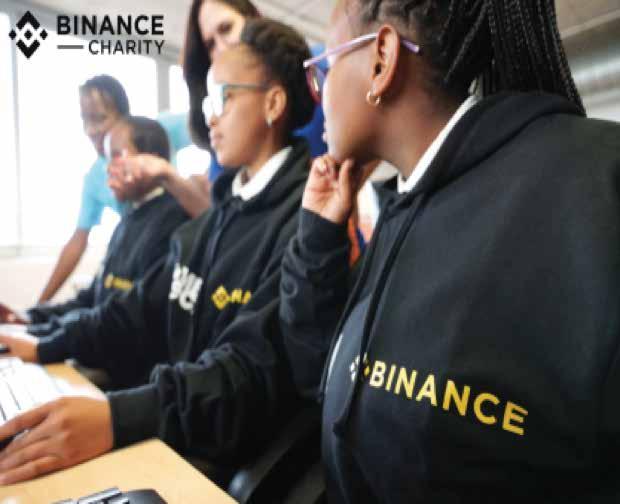
“The response to our Web3 education projects has been unprecedented, showing the keen appetite of so many people to learn about blockchain, De-Fi, NFTs, coding, and much more.
And, we’re seeing interest from a diverse range of people, including a great ratio of women, which is something I feel particularly passionate about.
With so many more education initiatives and amazing pipeline partners, we’ve never been more excited to build a more inclusive Web3 world,”
Said Helen Hai, Head of Binance Charity.
IT Generation kick-started the global Binance Charity Scholar Program in June, an initiative designed to help Eastern Ukrainians, who have lost their jobs due to the war, to re-train and re-enter the job market in Western Ukraine, in partnership with the Ministry of Digital Transformation.
Other projects include vocational training for 10,000 people, including a speci c course for 2000 women reducing the gender gap in the ecosystem and increasing the diversity of talent supply with the Frankfurt School of Blockchain, Germany. In France, we’ve partnered with Simplon to enable 10,000 people from disadvantaged communities in France - where unemployment is rapidly rising - to learn, study and enter the growing Blockchain industry.
“What we saw was interesting–I
knew a little bit about the world of cryptocurrency before, but this time I got to learn about blockchain technology. It was clear– I had no idea you could do so much with it. I can’t wait to learn more,” comments Terry Genly, student Simplon. In Brazil and South Africa, we’re working with Women in Tech to provide vocational training for 2,800 women in rural communities, creating future entrepreneurs and job creation. And, UTIVA in Nigeria educates 50,000 young people in Blockchain/Web3 and provides scholarships for 1,000 Africans in a 1-year intensive skill training program, supporting them to move into employment.
Courses are available both online and o ine, varying in length from short intro classes to a 12-month commitment. Topics include blockchain application, coding,
cryptocurrency, decentralization, NFT, Metaverse, Fan token, and Trading. This is just the beginning of Binance Charity’s education initiative, more projects are set to be announced early this year.
Binance Charity
Binance Charity is a non-profit organization dedicated to unlocking Web3 as a powerful tool for social change. Its mission is to enable Web3 as a driver of social transformation by making its education and research accessible to all and advancing global solutions for local humanitarian impact. Binance Charity uses its 100% transparent donation platform to build a future where technology is used as a force for good. To date, Binance Charity has supported over 2 million end bene ciaries through various projects. For more information, visit https://www.binance.charity/.
PUBLISHED BY INVESTMENTTIMES EDITOR: BENSON AFFUL PHONE +233 54 551 6133 MAIL info@investmentimesonline.com ADDRESS Plot 91 Baatsona | Spintex - Accra Thursday 19 January 2023 – Investment Times A N E W T HINKI N G






















































